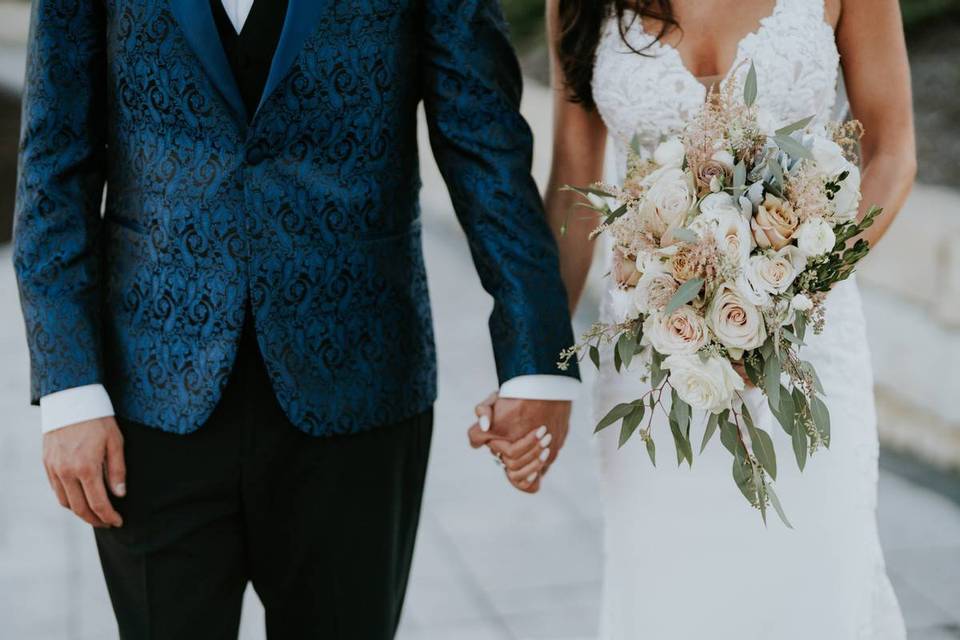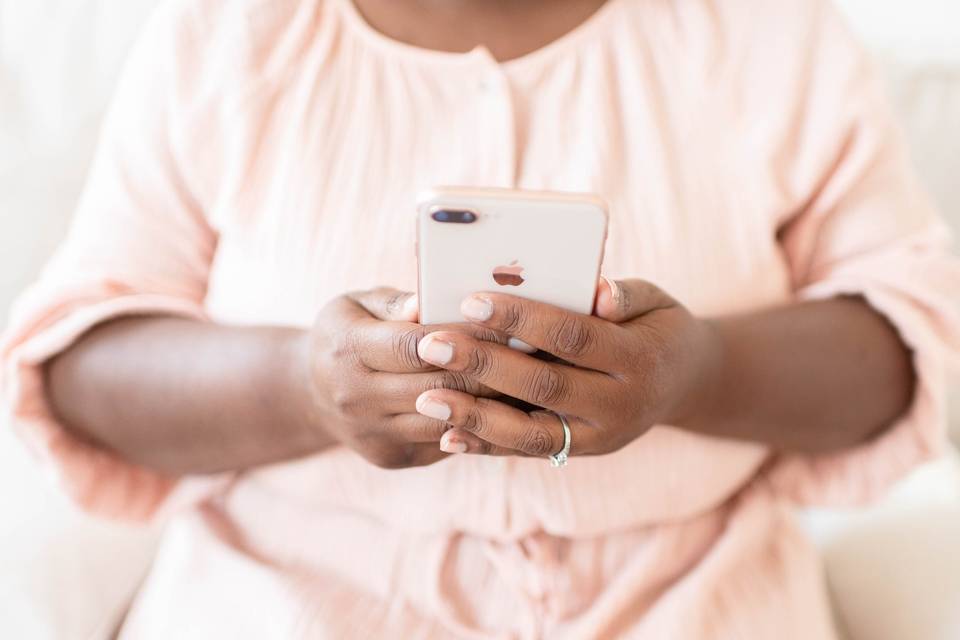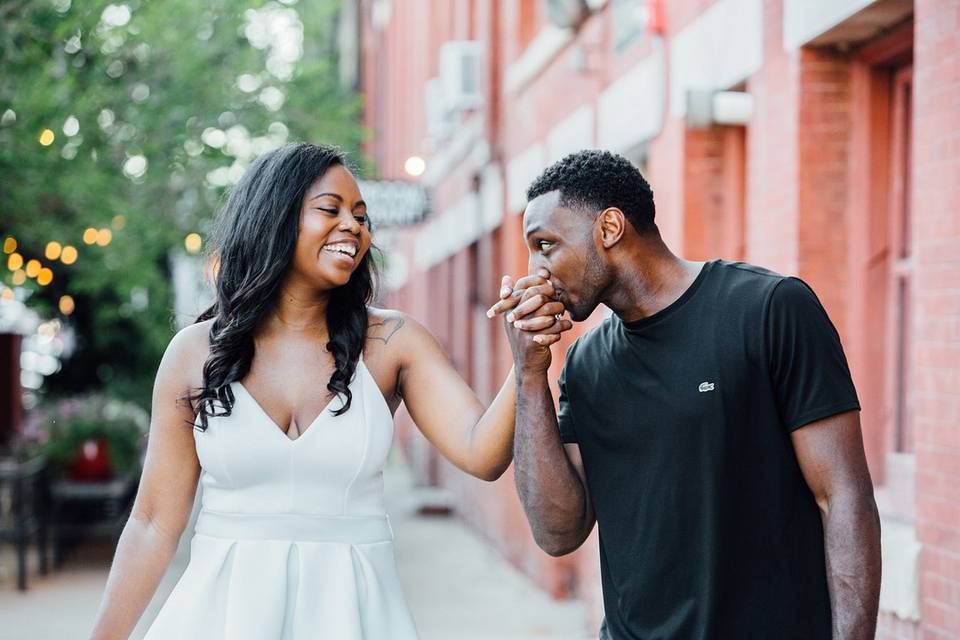“I Just Wanted My Wedding Vendors to Like Me, and Here's Why It Backfired”
One bride's effort to please her pros ended up causing disappointment for both herself and her wedding vendors—here's how to avoid the same mistake.

As a newly-engaged person entering wedding planning, there’s one thing I didn’t even realize I wanted right from the start: I wanted my vendors to like me. I always try to be a kind person and hope that those I meet enjoy my company, but this felt different. Since these were people whom I was going to be entrusting my big day with and asking to help achieve my visions, I wanted them to want to work with me.
You don’t have to be anywhere near ready for marriage to have heard of tales of engaged folks making life a nightmare for those around them. Or couples who completely lose perspective and get irrationally caught up on minute details like varying shades of cream. I knew I wasn’t that person but the problem was, I feared using my voice at all in the planning process would make me come across as “that bride.”
With that in mind, I went into initial calls and meetings with vendors determined to be the opposite: chill, down-to-earth, and hopefully refreshing to work with. Unfortunately, this backfired as it led to me staying quiet and “going with the flow” more than I should have from the very beginning — instead of voicing meaningful opinions or trusting my gut. Vendors can’t read your mind and engaged couples aren’t going to feel heard or supported if they aren’t clear about their needs.
Focusing so hard on coming across as likeable also distracted me from realizing from the start that one of my vendors wasn’t the right one for me. Looking back, here’s what I’ve since learned from my mistake, and what other engaged couples should focus on as they’re working with vendors.
Don’t get caught up in the labels.
Similarly to an assertive woman being labeled as “bossy,” the term “bridezilla” is, at its core, a gendered and unfair label, explained Jen Ganson, owner and lead planner at A Fresh Event in Evanston, Illinois. “When it comes to planning her wedding, brides should not be criticized for knowing and asking for what she wants, especially given all the time and money she is investing into services to bring her ideal wedding day to life,” she said. “We encourage our couples to focus on being true to themselves.” And the best way to get the planning experience you deserve is to be yourself and hire vendors that you feel you align with both creatively and on a personal level.
Confronting difficult conversations head-on doesn’t make you difficult.
Instead, the sooner you speak your mind the better it will be for both sides. “You don’t want your feelings to snowball and it will turn into resentment,” said wedding planner and designer Lizzy Liz Chan of Lizzy Liz Events in Huntington Beach, California. “Everyone appreciates transparency and communication.” Instead of avoiding these chats, she suggests figuring out what solution you want first before going into the conversation.
Don’t be afraid to use visuals.
During the planning process, I now realize that I came across as “wishy-washy” instead of clearly articulating what I wanted. Part of this was because I wasn’t exactly sure and the other part was I didn’t want to use a ton of photos that I found because I didn't want to be “held” to a certain vision just because I had pinned it to an inspiration board. And the other part was that I trusted my vendors as the experts to do their thing and know better than what I could come up with from scrolling through Pinterest. But this doesn’t mean that they are mind readers.In a situation like this, Chan recommends creating bullet points so you can organize ideas and connect the patterns of what it is that you really want. “At the end of the day, your creative partners that you have hired have one goal, to create a very special day for you and your partner,” she said. “So you really need to help us get to where you want because we’re definitely not mind readers. We rather have information overload than nothing at all.”
Don’t be afraid to find your voice.
It's one thing to not know what you want because you've never been married before and this is all a new experience for you, but it’s another thing to defer to the opinions of others out of fear of being perceived as overbearing, explained Leah Weinberg, owner and creative director of Color Pop Events in Long Island City, New York. In the first situation, you would want to feel comfortable leaning on your vendors to help you understand what your options are so you can review the possibilities and then make a decision based on what you and your partner want. “In the second situation, you're going to have to find your voice — but being decisive when it comes to wedding planning is actually a very admirable trait in the eyes of your vendors, so no one here is going to think you're overbearing,” she said. “We're going to think you know what you want and know how to communicate what you want. And we're going to love you for it.”
If you don’t like a vendor’s idea, be honest.
You can’t be scared to talk to your creative partners on how you feel. “Remember that we’ve all signed up for this career and we want to make your dreams come true — so tell us how,” said Chan.
Couples also need to remember that wedding vendors are professionals and are hired to provide a service for a client. “Couples don't have to worry about hurting our feelings if they don't like our ideas or if they provide constructive feedback to something,” Weinberg added. “Our number one priority is to make our clients happy, and we won't know how to do that unless the client clearly communicates to us what they want and need. So, don't be afraid of clear and direct conversations.”
Listen to your gut when hiring your vendor team.
Not every vendor is right for every couple and that’s perfectly fine. It’s not a reflection on the type of person you are—trusting your gut from the beginning is what’s important here. If the vendor isn’t someone you feel you can have an honest conversation with from the start, don’t go with them. It’s a day that we cannot redo, reminds Chan, and since you’re investing so much financially and emotionally, you should be able to tell us what your vision is. “You can’t be scared to talk to someone who you are hiring,” she added. “Would you hire painters and hope they choose the right shade of gray for you? Absolutely not! You want to make sure that shade of gray matches your personality, your furniture, and what it looks like with the lighting in your home.”
Don’t overlook a wedding planner.
When I first started wedding planning, I opted to hire a “weekend of” coordinator instead of a full-service planner because I found my other vendors on my own and didn’t think I would need additional support outside of logistics come wedding day. However, I now see that I missed out on priceless support along the way.
That’s why Chan suggests finding a wedding planner you can truly trust and be transparent with from the beginning. They’ll be able to work with you on uncovering exactly what you want and then communicating that to vendors to ensure everyone is on the same page come wedding day.
Ganson has also experienced many vendor meetings with clients, where she could tell they were holding back, only to leave the meeting and have them say that they weren’t feeling like their vision was being heard. “One of the many perks to having a wedding planner is that we can step in, smooth out any miscommunication and quickly get everyone back on the same page,” she added.
Give yourself a break.
I lost some of the joy from my planning experience by worrying about how everyone else around me was feeling. But it wasn’t until finally talking to newly married friends that I realized I wasn’t the only one — and we need to stop putting this pressure on ourselves. “It is incredibly self-aware to even be paying attention to how they come off to vendors. So, first, let me say kudos to anyone who is being mindful of that,” added Weinberg. “I tend to think that someone with that level of self-awareness probably won't have ‘bridezilla’ or ‘groomzilla’ tendencies to begin with because they are attuned to their behavior and how they are perceived.”





